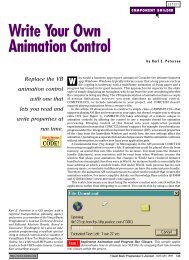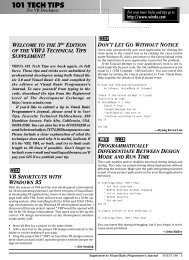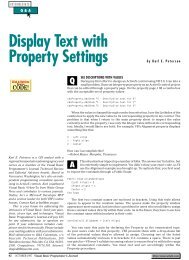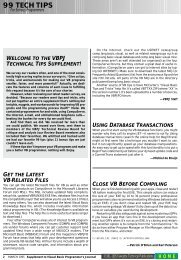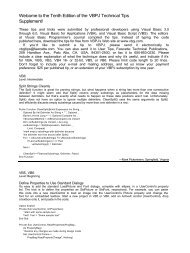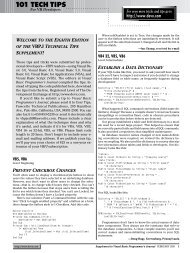101 Tech Tips - Visual Studio Magazine - One-Stop Source Shop
101 Tech Tips - Visual Studio Magazine - One-Stop Source Shop
101 Tech Tips - Visual Studio Magazine - One-Stop Source Shop
- No tags were found...
You also want an ePaper? Increase the reach of your titles
YUMPU automatically turns print PDFs into web optimized ePapers that Google loves.
<strong>101</strong> TECH TIPSFor <strong>Visual</strong> <strong>Studio</strong> DevelopersVB3, VB4, VB5, VB6Level: AdvancedBoundless Array IndexingUse this function for getting the 10th next element from an arraywith “circular” contents such as “Monday,” “Tuesday,” and so on:intCurrent = WrapIndex(Index:=intCurrent, _Move:=+10, UpperBound:=6)You don’t have to think about passing the end of the array as longas that’s what you want to do:Public Function WrapIndex(ByVal Index As Long, _ByVal Move As Long, _ByVal UpperBound As Long, _Optional ByVal LowerBound As Long) As Long' Function for incrementing an index past UB' and starting over from LB, or the other way' around.' If LowerBound is omitted, 0-base is assumed.Dim lngCount As LongIf UpperBound = LowerBound ThenWrapIndex = LowerBoundElse' Swap UpperBound and LowerBound if neededIf LowerBound > UpperBound ThenLowerBound = LowerBound Xor UpperBoundUpperBound = LowerBound Xor UpperBoundLowerBound = LowerBound Xor UpperBoundEnd If' number of elements in rangelngCount = UpperBound - LowerBound + 1' Move Index inside of range' LowerBound...UpperBound if neededIf Index < LowerBound ThenIndex = UpperBound - ((LowerBound -_Index) Mod lngCount) + 1ElseIf Index > UpperBound ThenIndex = LowerBound + ((Index -_UpperBound) Mod lngCount) - 1End If' Move to the new indexSelect Case MoveCase Is > 0WrapIndex = (Index - LowerBound + _Move) Mod lngCount + LowerBoundCase Is < 0WrapIndex = (Index - LowerBound + _lngCount - Abs(Move Mod lngCount)) _Mod lngCount + LowerBoundCase 0WrapIndex = IndexEnd SelectEnd IfEnd Function—André Lomøy, Oslo, NorwayVB4/32, VB5, VB6, VBS, SQL 7.0 and upLevel: IntermediateAvoid Zero-Length String Parameter FailuresHave you ever had a zero-length string parameter fail when attemptingto execute a stored procedure from ADO? You’ll find thiswarning buried in the ADO documentation under the Appendmethod for the Parameters collection: “If you select a variablelengthdata type, you must also set the Size property to a valuegreater than zero.” This refers to any parameter passed as typeadLongVarChar, adLongVarWChar, adVarChar, or adVarWChar. Iuse adVarWChar to send a parameter to a SQL Server storedprocedure expecting a varchar(N), so I’ve had problems with zerolengthstrings. If you pass a zero-length string and use VB’s Lenfunction to retrieve its length, an error results when the length ispassed as 0.I wrote a simple function, LenStringParameter, to return alength of 1 instead. Place the function in a module to make itavailable from anywhere in your app:Function LenStringParameter(strParam As String) As Long' From the ADO BOL: "If you select a variable-length' data type, you must also set the Size property to a' value greater than zero."' The length must be passed as 1 even if the string' is empty or Null.LenStringParameter = IIf(Len(strParam) = 0, 1, _Len(strParam))End FunctionTest this function by substituting LenStringParameter for Lenwherever needed:Public Function TestStringParameter() as StringDim strMyTestValue As StringDim intOtherValue As IntegerstrMyTestValue = TextMyKeyValue.Text' Read from a text field, or assign directly.intOtherValue = 1Dim cmdADO As ADODB.Command: Set cmdADO = _New ADODB.CommandWith cmdADO.ActiveConnection = strConnection' Your connection string or connection here..CommandType = adCmdStoredProc.CommandText = "spReturnMyAnswer".Parameters.Append .CreateParameter("MyTestValue", _adVarWChar, adParamInputOutput, _LenStringParameter(strMyTestValue), _strMyTestValue).Parameters.Append .CreateParameter("OtherValue", _adInteger, adParamInputOutput, _Len(intOtherValue), intOtherValue).Execute' Pick up the return values.strMyTestValue = .Parameters("MyTestValue").ValueintOtherValue = .Parameters("OtherValue").ValueEnd WithSet cmdADO = NothingTestStringParameter = strMyTestValueEnd FunctionA word of caution: If you expect an adParamInputOutput typeparameter’s return value to be larger than the size going in, don’t useLenStringParameter. You’ll receive truncated data. In other words,if LenStringParameter returns 20, and 20 is sent as the size of anadParamInputOutput type parameter, a maximum of 20 characterswill be returned, even if the stored procedure sets the value of theOUTPUT parameter to a value longer than 20 characters. Instead,set the size to the maximum allowed by the stored procedure. If thestored procedure expects a varchar(25) OUTPUT, send the lengthas 25. If it returns less than 25, the extra space will be discarded.—Jake Mireles, Houston12 Supplement to <strong>Visual</strong> <strong>Studio</strong> <strong>Magazine</strong> SEPTEMBER 2001



